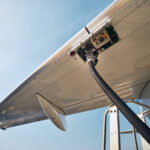As companies look toward helping the environment, NBAA offers a flight plan for sustainability
The National Business Aviation Association (NBAA) is getting serious about leading the way for environmental sustainability within aviation. They just introduced an accreditation program that will recognize business aviation organizations willing to flight plan their way to help our planet. True, there is already a movement underway to create a sustainability culture in business aviation. NBAA wants to highlight the organizations that go above and beyond in their effort to make a difference.
So far, the program is still in its infancy, but NBAA is planning a formal launch this fall at NBAA-BACE in Las Vegas. For enrolled members, NBAA will provide online educational materials and training components to help establish guidelines for creating a new way of running a business aviation organization. To check eligibility for the certification, virtual audits will be performed along with random in-person reviews to confirm the promotion of a culture of sustainability.
According to nbaa.org, the accreditation program will focus on four areas:
- Flight
- Reducing environmental impact while conducting flights, such as carbon emissions, noise levels, and sustainable aviation fuels.
- Operations
- Optimizing a culture of sustainability emphasizes personnel and systemic environmental programs, such as recycling and reducing resources.
- Ground Support
- Creating strategies for sustainability-related to ground support, such as equipment and vehicles and selecting vendors that share the same values.
- Infrastructure
- Increasing sustainability through physical buildings, such as hangars and facilities.
Business aviation, in general, is off to a great start. Engine technologies have become sufficiently advanced to offer a reduction in fuel burn, noise, and emissions. NextGen avionics is designed to permit more direct routing, and sustainable aviation fuel (SAF) is becoming more and more available at numerous locations across the country and the world. But there is more work to be done, and it is up to the individual flight departments to do their part in making an overall difference.
Organizations participating in this program can pursue accreditation in each of the four areas independently or go for full credit on all four combined. A limited number of companies have been invited to participate in a pilot program over the next several months to test the validity of the prototype and provide feedback. So far, it’s been positive, with the example of pilots filing their flight plans based on the availability of SAF fuel at their destinations. I’d say that’s a win/win for business aviation and the environment. I can’t wait to see where this takes us in the future.









